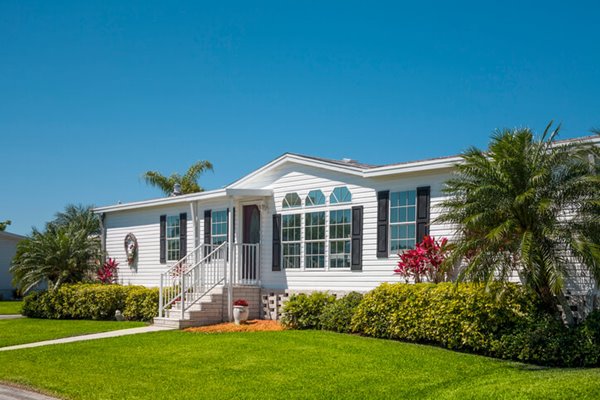A manufactured home is a home that is built in a factory and then delivered to the buyer’s chosen site. A typical manufacturer produces many homes at a time, gaining economies of scale and keeping overall costs down.
Although some people refer to manufactured homes as mobile homes, they’re not all that mobile. The home sits on a permanent chassis, on land that the owner either owns or leases. Some buyers do choose to move manufactured homes, but there’s a big difference between modern manufactured homes and their predecessors, mobile homes, which could be hitched to a truck and easily pulled to the next destination.
Who Regulates Manufactured Homes?
Federal HUD building codes dictate quality and safety standards for manufactured homes. Each manufactured home bears the HUD Manufactured Home Construction and Safety Standards (MHCSS) certification label. Work done on site, like set-up, electrical work, and plumbing, meets state, local or regional building codes just like traditional homes.
How is a Manufactured Home Constructed?
An engineer uses computer-aided drafting to design a home to the buyer’s specifications. Because it’s built in a factory, a manufactured home can be built more efficiently than a site-built home. Work can continue in spite of inclement weather or other factors that often hold up traditional new home construction. Plus, by buying at scale, the builder gets good prices, which they pass along to the home buyer. Come take a visit a modular home design center to see for yourself how we manufacture homes.
How Long Can a Manufactured Home Last?
Any manufactured home built according to MHCSS requirements should last as long as a site-built home. These regulations were implemented in 1976, so most manufactured homes currently available follow them. Find a reputable dealer (more on that below), and you will live in your home as long as you like, with only typical home upkeep. Jacobsen Homes come with a 10-year structural warranty.
How to Finance a Manufactured Home
A growing number of lending institutions provides conventional and government-insured loans to buyers of manufactured homes. Manufactured homes are eligible for Federal Housing Administration (FHA), Veterans Administration (VA), and USDA mortgages.
The type of mortgage available depends, in part, on whether the buyer purchases the land as well. Your manufactured home dealer or lending institution can help you find the right financing for your situation.
For more information on financing, check with your local retail center or community.
Finding Land for a Manufactured Home
Some buyers purchase land where they plan to place their manufactured home. When looking for land, confirm that the desired neighborhood is zoned for manufactured homes and check on any size restrictions.
Other buyers lease land, typically in communities that specifically serve this purpose. Manufactured home communities offer many amenities, along with a sense of community that many homeowners appreciate. Some of these communities cater to residents age 55 and up, while others welcome all ages.
What Floor Plans and Features are Available for a Manufactured Home?
As the manufactured home industry matures, designers can create just about any floor plan that a buyer wants. Jacobsen is at the forefront of the industry, offering a range of floor plan options beyond what most competitors can offer. Choose from small (2-3 bedroom) floor plans to large (3-5 bedroom) floor plans ranging beyond 2,000 square feet, as well as custom luxury layouts.
Some manufactured home builders produce cookie-cutter homes with little personalization. However, Jacobsen offers a wide range of features and upgrades. Make your home uniquely yours with tile backsplashes, cabinet upgrades, stainless steel appliances, fireplaces, soaking tubs, and more.
Who is a Manufactured Home Right For?
All kinds of people enjoy the benefits of manufactured homes. The consumer advocacy nonprofit Prosperity Now reports that 17.7 million Americans live in manufactured homes as of 2019. Some people choose them as affordable first homes, while others downsize to a manufactured home in retirement. Others buy them as vacation homes or “snowbird” destinations in warm spots like Florida. The flexibility of different floor plans means there are good options for individuals, couples, and families, whether it’s for a permanent home or a seasonal getaway.
Explore Your Manufactured Home Options
Once you understand what a manufactured home is and all that it can offer, you can start exploring your options. Discover the options and features that work for you and your family. When you’re ready to schedule a tour, get in touch with us!. We look forward to hearing from you.

